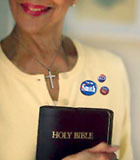
Tell someone that Notre Dame has a strong theology department, and it won’t likely amount to a “stop-the-presses” moment.
Having a religious identity positions the University to excel in much more than the study of religion itself, however, and Professor Mike Desch, chair of the Department of Political Science, thinks his field is one of those with much to gain from considering the impact of people’s faith.
This isn’t a traditional view, according to Desch, a highly regarded expert in international relations. While many at Notre Dame share it, he says examinations of religion and politics have long been viewed as little more than footnotes by the broader discipline.
“But given the resurgence of religion in American politics with the rise of the religious right in the late 1970s, the clear influence of religion in the transitions to democracy in Latin America and Eastern Europe in the 1980s, and then the emergence of militant Islam in the years before 9/11, making the case for the study of religion and politics … is today very straightforward.”
Fittingly, Notre Dame is fast becoming a leader in this arena.
Desch says the department is embracing a new, integrative focus on religion and politics, one that seeks to engage each of its subfields. Three faculty who started this fall—Geoffrey Layman and Phillip Muñoz, both associate professors, and Rev. Sean McGraw, C.S.C., an assistant professor—will play key roles in defining that approach.
“Notre Dame’s emphasis on the study of religion and society—not just in political science but also in sociology, history, theology, and a range of other disciplines—was a huge plus for me given my own research interests,” says Layman, who works in American politics. “I also think that with the faculty on board in political science that Notre Dame is probably the best place in the country to study and train students in religion and politics.”
David Campbell, John Cardinal O’Hara, C.S.C., Associate Professor of Political Science, calls Layman’s 2001 book The Great Divide: Religious and Cultural Conflict in American Party Politics the seminal work on the subject. More recently, Layman co-authored “Will Americans Vote for Muslims? The Impact of Religious and Ethnic Identifiers on Support for Political Candidates,” which won the Paul J. Weber Award for the best paper on religion and politics presented at the 2008 American Political Science Association meeting.
Like the rest of the department’s American politics faculty, Layman is part of the University’s Rooney Center for the Study of American Democracy. This October, the center gathered scholars from across the country for a conference on the 2008 presidential election.
The role of religion certainly wasn’t the emphasis of the conference, says Campbell, who is the center’s director, but it was the topic of his presentation and did emerge as a theme in many others.
For him, it’s no surprise why.
“In 2008, we saw Mitt Romney address doubts about his Mormon faith and Barack Obama tackle the controversy surrounding his pastor,” Campbell notes. “We saw Mike Huckabee, an ordained Baptist minister, blend social conservatism and economic populism and Sarah Palin energize the evangelical base of the Republican Party. For the first time … the Democratic presidential candidates participated in a forum dedicated exclusively to a discussion of their religious faith.”
The Rooney Center also houses the Tocqueville Program for Inquiry Into Religion and American Public Life, led by Michael Zuckert, Nancy Reeves Dreux Professor of Political Science, and the newly hired Muñoz.
But to Department Chair Desch’s point about integration across subfields, it’s not only scholars in American who find the effect of faith to be a phenomenon worth studying. Both Zuckert and Muñoz are political theorists, as well, and the interests represented by their colleagues in that area range from Christian political thought and Catholic political theory to the intersection of ethics and political philosophy.
In international relations, Associate Professor Daniel Philpott, a specialist in reconciliation and faith-based diplomacy, is co-authoring a book titled God’s Century, which documents a resurgence of religion in global politics and seeks to explain why religious actors take on diverse political pursuits.
The comparative politics faculty includes the department’s third new face, McGraw, whose research deals in part with how religion figures into the relationship between civil society and social capital. He joins scholars such as Associate Professor Frances Hagopian, the editor of Religious Pluralism, Democracy, and the Catholic Church in Latin America. Published earlier this year, the book is the culmination of a workshop and an international conference she organized through Notre Dame’s Kellogg Institute for International Studies.
“My hope was that an investment by Notre Dame would raise the prestige of work on religion and the Catholic Church in Latin America and inspire a new generation of scholars in the social sciences to focus dissertation and other research on the topic,” Hagopian says. “The book aimed to put religion back on the front burner in studies of politics, society, and democracy in Latin America.”
And this much seems clear: She isn’t the only one in her department who would deem that a worthy endeavor.
Originally published at al.nd.edu on December 16, 2009.